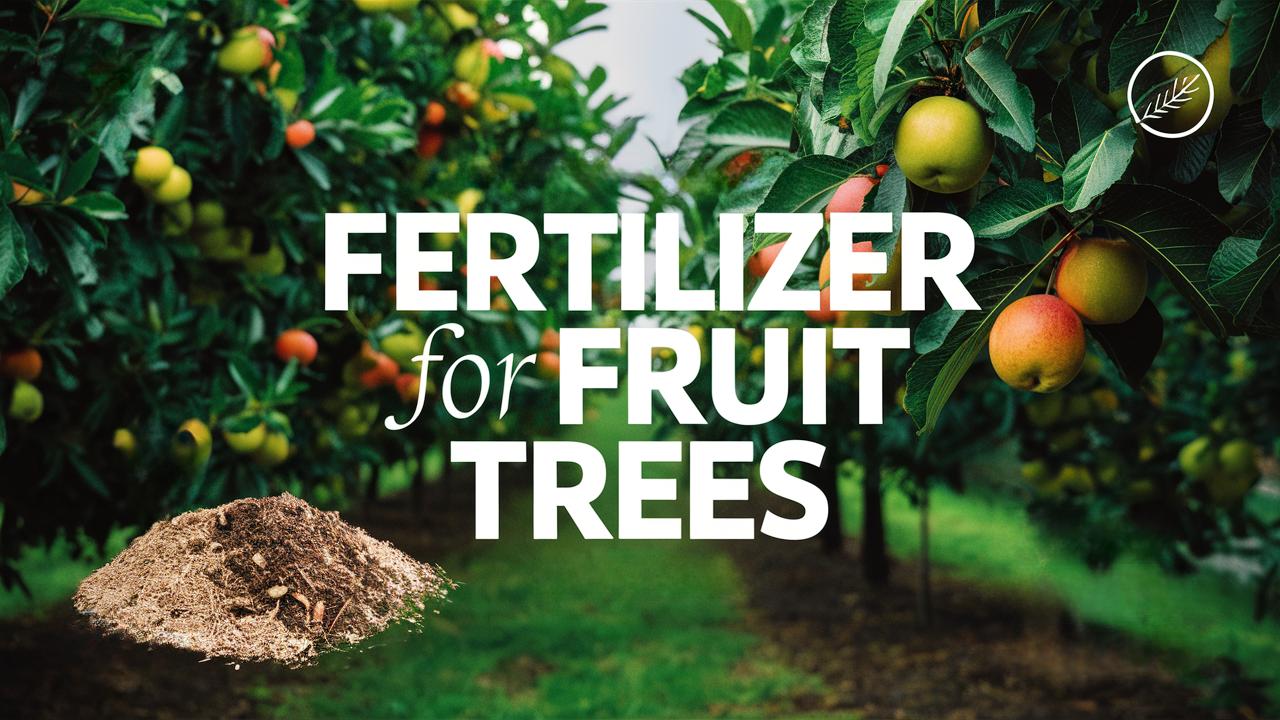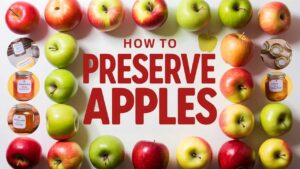In this guide, we’ll help you choose the best fertilizer for your fruit trees, exploring essential nutrients, the specific needs of various types of fruit trees, and organic versus synthetic options.
Fertilizer For Fruit Trees
| Image | Name | Rating | Shop |
|---|---|---|---|
 | Tree-Tone Organic Fertilizer. |  | |
 | Dr. Earth Organic Fruit Tree Fertilizer |  | |
 | True Fruit & Nut Food |  |
Tree-Tone Organic Fertilizer.
Espoma Organic Tree-Tone is a top choice for fruit tree care. As an all-purpose, organic fertilizer, it can be used on a variety of trees including peach and apple trees, as well as shade trees.
With its rich blend of natural and organic ingredients and exclusive Bio-tone formula, Espoma Organic Tree-Tone offers a safe and effective way to promote healthy growth. This 6-3-2 fertilizer analysis is paired with 5% calcium for added nutritional value. Plus, it’s easy to use: simply apply in the spring and fall when your fruit trees need it most. As an additional convenience, it comes ready to use without any mixing required.
Dr. Earth Natural Wonder Fruit Tree Fertilizer
The Dr. Earth Natural Wonder Fruit Tree Fertilizer is a great option for fruit tree owners who want a natural and effective way to feed their trees. This fertilizer has a balanced NPK formula of 5-5-2, which provides essential nutrients for healthy growth and fruit production.
This product is particularly appealing because it’s made from sustainable ingredients in the USA and is certified organic and non-GMO project verified. It’s also people and pet safe, making it a great choice for home gardeners with families or pets that like to explore the yard. A 4-pound bag of this fertilizer can feed a 60 square foot area or 16 five-gallon containers, providing up to two months of nutrient-rich food for your fruit trees.
True Fruit & Nut Food
True Organic Fruit & Nut Food is a fertilizer option that’s suitable for fruit trees, promoting healthy growth and optimal yields. It’s specifically formulated with a blend of ingredients to support plant health and robust fruiting, making it an effective choice for your orchard.
If you’re looking for a way to prevent blossom end rot in your fruit or nut trees, this product is a good option. It contains 4% calcium, which can help address blossom end rot issues and ensure the quality of your harvests. The generous coverage area makes it suitable for both small and larger plantings, with the 12lb bag covering up to 210 sq. ft.
Down to Earth Fruit Tree Fertilizer
The Down To Earth All Natural Fertilizers Organic Fruit Tree Mix 6-2-4 is a great choice for those looking to promote bountiful harvests from their fruit trees. This all-natural fertilizer has a specially formulated blend of primary nutrients and added calcium that’s designed to encourage healthy plant growth and proper fruit development.
This OMRI-listed product can be used on a wide variety of fruiting trees, shrubs, and canes, making it a versatile option for home orchards. The ingredients include natural sources like feather meal and alfalfa meal, as well as calcium carbonate to support healthy tree growth. With its long shelf life, just stored in a cool dry place, the Down To Earth All Natural Fertilizers Organic Fruit Tree Mix 6-2-4 is an excellent choice for keeping your fruit trees thriving.
Fruit Tree Formula
This fruit tree booster fertilizer from Farmer’s Secret is a great option for anyone looking to promote healthy growth and abundance in their trees. With its phosphorus-rich formula, it’s specifically designed to support optimal performance during the early growth cycle of fruit trees.
One of the benefits of this product is its super concentrated formula – just one teaspoon per gallon of water goes a long way, making it easy to use without waste. The instructions also vary depending on the stage of your tree: you may need up to five or ten teaspoons per week for younger or more mature trees.
Jobe’s Organic Fertilizer
The Jobe’s Organics Granular Garden Fertilizer is a solid choice for fertilizing your fruit trees. This 4-pound bag provides long-lasting nutrition with its 3-5-5 NPK formulation, which helps promote high yields and vibrant foliage. The fact that it’s OMRI listed by the USDA for organic gardening gives you peace of mind when choosing an environmentally friendly option.
This fertilizer is designed for easy application and avoids common issues like wasteful runoff and strong odors. It’s also non-toxic, eliminating the risk of accidentally over-fertilizing your plants. Simply apply it every 4-8 weeks during the growing season, and adjust as needed to ensure your fruit trees are getting the nutrients they need to thrive.
Shake ‘N Feed Citrus, Avocado, Mango
Miracle-Gro Shake ‘N Feed Citrus, Avocado, Mango Plant Food is a good option for fertilizing fruit trees like citrus, avocado, and mango. This product provides essential nutrients such as potassium, magnesium, sulfur, and iron to address common nutrient deficiencies.
This plant food can be used on both in-ground and container plants, making it versatile for different types of gardens. The formula feeds the plants for up to 3 months at a time, reducing the need for frequent reapplication. Simply shake the product onto the soil spread within the branches, avoid direct contact with trunks or foliage, and water for optimal results.
How to Choose the Best Fertilizer for Fruit Trees
Growing fruit trees is a rewarding endeavor for both novice gardeners and seasoned horticulturists. However, ensuring that your trees receive the right nutrients is crucial to their health and productivity. The choice of fertilizer directly impacts the growth, flavor, and yield of the fruit, making it one of the most critical decisions in the care of your trees.
Understanding the Nutritional Needs of Fruit Trees
Before selecting a fertilizer, it’s essential to understand what your fruit trees need nutritionally. Just like humans, trees require a balanced diet to thrive, which includes macronutrients and micronutrients.
Macronutrients
Nitrogen (N): This nutrient is vital for healthy foliage and overall growth. It promotes robust leaf development, which is essential for photosynthesis. A nitrogen deficiency can result in stunted growth and yellowing leaves.
Phosphorus (P): Crucial for root development and flower formation, phosphorus enhances the tree’s ability to produce fruits. It also plays a role in energy transfer processes within the plant.
Potassium (K): This nutrient helps regulate water usage and is essential for the overall health of the fruit. Potassium strengthens plant cells and contributes to the taste and quality of the fruit.
Micronutrients
In addition to macronutrients, fruit trees also require several micronutrients in smaller quantities, including:
Magnesium: Important for chlorophyll production.
Calcium: Supports cell wall structure and root development.
Iron, Zinc, and Manganese: Play various roles in enzyme function and chlorophyll synthesis.
A deficiency in any of these nutrients can lead to poor fruit development and tree weakness. Conducting a soil test can help identify any deficiencies specific to your planting area.
The Specific Nutritional Needs of Different Fruit Trees
Different types of fruit trees have unique nutritional requirements. Understanding these can significantly influence your choice of fertilizer.
Stone Fruits (Cherries, Plums, Peaches)
Stone fruits generally prefer a balanced fertilizer with a slightly higher nitrogen content, especially in the early stages of growth when leaf development is critical. Look for fertilizers that have a N-P-K ratio of around 10-10-10 or similar.
Pome Fruits (Apples, Pears)
Pome fruits benefit from fertilizers high in phosphorus and potassium, particularly during the flowering and fruiting stages. A fertilizer with a ratio of 5-10-10 can support their robust growth and fruiting.
Citrus Fruits (Oranges, Lemons, Limes)
Citrus trees thrive in slightly acidic soils and require a balanced supply of nutrients. A fertilizer high in nitrogen, such as a 3-1-1 ratio, paired with micronutrients like magnesium and iron, will enhance growth and fruit quality.
Berries (Strawberries, Blueberries)
Berries often prefer acidic soils. Use fertilizers that are low in nitrogen and high in potassium to support fruit production without promoting excessive foliage growth. An N-P-K ratio of 5-10-10 works well for these plants.
Organic vs. Synthetic Fertilizers: Choosing Your Path
The decision between organic and synthetic fertilizers can significantly influence your growing practice. Each has its pros and cons.
Organic Fertilizers
Advantages:
Slow Release: Organic fertilizers typically release nutrients slowly, allowing for prolonged feeding.
Soil Health: They improve soil structure, enhance microbial life, and contribute to overall soil health.
Environmental Safety: Organic options are generally safer for the environment, posing less risk of leaching into groundwater.
Disadvantages:
Nutrient Concentration: Organic fertilizers may not provide the same nutrient concentrations as synthetic options, which can be problematic in nutrient-poor soils.
Inconsistent Nutrient Profiles: The nutrient content can vary widely based on the source of the organic material.
Synthetic Fertilizers
Advantages:
Precision: They allow for precise control over nutrient concentration and ratios, making it easier to meet specific plant needs.
Immediate Availability: Nutrients from synthetic fertilizers are readily available to plants, leading to quicker results.
Disadvantages:
Soil Degradation: Continuous use can lead to soil degradation and reduced microbial activity over time.
Environmental Concerns: High runoff potential can lead to environmental issues, such as water pollution and algal blooms.
Ultimately, the choice between organic and synthetic fertilizers will depend on your gardening philosophy, the specific needs of your fruit trees, and the conditions of your soil.
Reading Fertilizer Labels: Understanding N-P-K
To make informed decisions, it’s essential to know how to read fertilizer labels. Each fertilizer is labeled with an N-P-K ratio, which indicates the percentage of nitrogen, phosphorus, and potassium.
How to Choose Based on N-P-K Ratios
For Young Trees: Higher nitrogen content is often beneficial for encouraging strong growth. Look for ratios like 10-5-5 or higher nitrogen in the first few years.
For Mature Trees: As trees mature and begin to bear fruit, a more balanced ratio, like 5-10-10, supports fruit development better than high-nitrogen formulas.
For Terminal Growth Preparation: As trees enter dormancy in the fall, lower nitrogen and higher potassium can help prepare them for the winter months. Ratios such as 5-10-10 are favored.
Application Timing and Methods
Choosing the right time to fertilize is as important as the type of fertilizer you select. Here are some considerations:
Timing
Spring: Typically, the best time to fertilize fruit trees is in early spring before new growth begins. This timing allows the trees to take full advantage of the nutrients during their active growth phase.
Early Summer: A second application may be warranted for heavy-fruiting trees or those that show signs of nutrient deficiency.
Fall: For some trees, particularly those entering dormancy, a light application of fertilizer can help them prepare for the winter months, promoting better spring growth.
Application Methods
Granular Fertilizers: These can be spread around the base of the tree, ensuring that nutrients permeate the root zone. Always follow the recommended rates to avoid burning the roots.
Liquid Fertilizers: These can provide a quick nutrient boost. Dilute according to package instructions and apply during watering.
Compost and Organic Matter: Incorporating compost into the soil at the beginning of the growing season can improve soil structure and provide a slow release of nutrients.
Testing Your Soil
One of the most effective ways to determine which fertilizer to choose is to conduct a soil test. Testing your soil can reveal:
Nutrient Levels: Knowing exactly what nutrients your soil lacks allows you to choose a targeted fertilizer.
pH Levels: The acidity or alkalinity of your soil can significantly affect nutrient availability. For example, many fruit trees thrive in slightly acidic soils (pH 6.0–6.8).
Soil Texture: Understanding your soil type (sandy, loamy, or clay) can influence how much water and nutrients it can hold, impacting your fertilization strategy.
Soil testing kits are widely available at gardening stores or through extensions of agricultural universities. Alternatively, you can send a sample to a local laboratory for detailed analysis.
Conclusion: Making the Right Choice for Your Fruit Trees
Choosing the best fertilizer for your fruit trees is a multifaceted decision that should take into account the specific needs of your trees, the health of your soil, and your gardening philosophy. Whether you opt for organic or synthetic fertilizers, understanding your trees’ nutritional requirements and applying the appropriate fertilizers at the right time can promote vibrant, healthy trees that yield abundant fruit.









